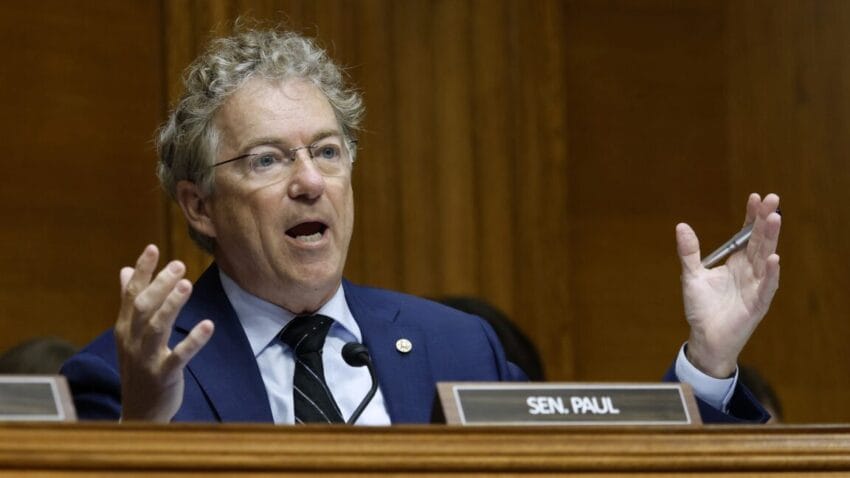
rand paul fcc chair had no business Senator Rand Paul (R-Ky.) has criticized Federal Communications Commission (FCC) Chairman Brendan Carr for his involvement in the recent controversy surrounding ABC and late-night host Jimmy Kimmel.
rand paul fcc chair had no business
Background of the Controversy
The incident in question revolves around comments made by Jimmy Kimmel during his late-night show, which some deemed offensive. Following these remarks, FCC Chairman Brendan Carr publicly pressured ABC to take action against Kimmel, suggesting that the network should suspend him for his comments. This intervention raised eyebrows among lawmakers and free speech advocates, prompting a backlash against Carr’s actions.
Senator Paul’s Response
In a recent appearance on NBC’s Meet the Press, Senator Paul expressed his disapproval of Carr’s intervention. He stated that the FCC chair’s actions were “absolutely inappropriate,” emphasizing that Carr “has got no business weighing in on this.” Paul’s remarks highlight a growing concern among some lawmakers regarding government overreach into media and speech.
Free Speech Concerns
Senator Paul’s comments reflect a broader debate about free speech in the media landscape. He articulated that while individuals can face consequences for their speech, such as being fired for “despicable comments,” it should not involve government interference. “The FCC should have nothing to do with it,” he asserted, reinforcing the idea that the government should not dictate what is acceptable speech on television.
Implications for Broadcast Media
Paul’s stance raises important questions about the role of government in regulating broadcast media. He pointed out that television is a commercial enterprise where ratings and sponsorships are crucial. “You have to sell sponsorships, you have to sell commercials, and if you’re losing money, you can be fired,” he explained. This perspective underscores the notion that market forces, rather than governmental oversight, should dictate the success or failure of television programming.
Stakeholder Reactions
The controversy has elicited varied reactions from stakeholders across the political spectrum. Some media analysts and free speech advocates have applauded Senator Paul’s defense of Kimmel, viewing it as a necessary pushback against government overreach. Others, however, argue that Kimmel’s comments warranted scrutiny and that networks have a responsibility to address potentially harmful speech.
Support for Kimmel
Supporters of Kimmel argue that his comedic style often pushes boundaries, which is a hallmark of late-night television. They contend that comedians should have the freedom to express their views without fear of government intervention. This perspective aligns with the First Amendment principles that protect free speech, even when that speech is controversial or offensive.
Criticism of Kimmel
On the other hand, critics of Kimmel’s remarks believe that public figures, especially those with significant platforms, should be held accountable for their words. They argue that certain comments can perpetuate harmful stereotypes or misinformation, and therefore, networks have a duty to respond appropriately. This viewpoint raises questions about the balance between free expression and social responsibility in media.
The Role of the FCC
The FCC has historically played a role in regulating broadcast content, primarily to ensure that it adheres to standards of decency and does not violate laws regarding obscenity or indecency. However, Senator Paul’s comments suggest a shift in how some lawmakers view the agency’s role in content regulation. He contends that the government should not be involved in policing speech, particularly in the context of entertainment programming.
Historical Context
The FCC’s involvement in content regulation has evolved over the years. In the past, the agency has faced criticism for its decisions regarding what constitutes acceptable content on public airwaves. The debate often centers on the balance between protecting the public from offensive material and ensuring that free speech rights are upheld. Senator Paul’s remarks may signal a growing sentiment among some lawmakers that the FCC should limit its role in content oversight.
Future Implications
As the media landscape continues to evolve, the implications of this controversy may extend beyond just the ABC and Kimmel situation. If the FCC is perceived as overstepping its bounds, it could lead to calls for reform or even a reevaluation of its regulatory powers. This could have lasting effects on how broadcast media operates and how content is created and distributed.
Potential Legislative Actions
In light of the controversy, some lawmakers may consider introducing legislation aimed at clarifying the FCC’s role in content regulation. Such measures could seek to protect free speech rights while ensuring that the agency remains focused on its core mission of promoting competition and protecting consumers in the telecommunications sector.
Public Sentiment
The public’s response to the Kimmel controversy and the FCC’s involvement may also influence future regulatory actions. If a significant portion of the audience perceives government intervention as unwarranted, it could lead to increased advocacy for free speech protections in media. This sentiment may resonate with voters, prompting lawmakers to take a more hands-off approach regarding content regulation.
Conclusion
Senator Rand Paul’s condemnation of FCC Chairman Brendan Carr’s intervention in the ABC and Jimmy Kimmel controversy highlights a critical discussion about the boundaries of free speech and government involvement in media. As the debate continues, it remains to be seen how this incident will shape future policies and the role of the FCC in regulating broadcast content. The balance between protecting free expression and ensuring responsible media practices will likely remain a contentious issue in the coming years.
Source: Original report
Was this helpful?
Last Modified: September 23, 2025 at 2:37 am
2 views















